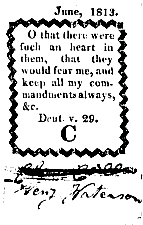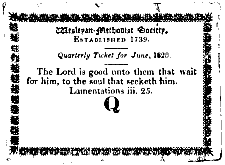

June 1828; subsequent tickets up to at least the 1880's were very similar,
Tickets played an important role in Methodist Life - members had to earn their ticket by regular attendance at Class, or Band, meetings. These tickets would be needed to gain entry to many services (e.g. Lovefeasts)
I have no illustration of PM tickets but the following two (from a scrapbook in the Manx Museum) illustrate Wesleyan Tickets
|
|
|
|
June 1828; subsequent tickets up to at least the 1880's were very similar, |
All tickets were obtained from the Methodist Book Room (London) and thus were the same throughout the connexion .
[extract from Crowther Portraiture of Methodism, 2nd Ed 1815 pp280/282]
In December, March, June, and September, the tickets are renewed. And in the large circuits, especially, greatly adds to the preacher’s labour, yet it is a work of importance and general advantage of the societies. The tickets are printed at our own press in London, with text of scripture upon them, which is varied each quarter and a letter of the alphabet, going regularly through, then beginning again Two out of every ten have a small b upon them in addition to the other letter; these are designed to be given to such as meet in band. And are in the following form:
The tickets are the same each quarter, all over the connection. At the time of giving the tickets, the preacher sees by the usual marks, whether the members have met well or ill; and if they have not met well, he inquires into the cause. He speaks to each person respecting his or her religious experience, much in the way that a leader speaks to each member in his class. He blots out the names of any who have left the society, or any who have been judged unfit to be continued members; and also sets down the names of new members.
In some places the preacher has to meet the bands, after he has done preaching. A band seldom consists of more than three or four persons. These persons are supposed to be nearly in the same state of grace, or in other words, their attainments in religion are supposed to be nearly equal. And the bands do not consist of men and women together as in many of the classes, but men only, and women only, are in the bands.
NOW the meeting called "the bands,’ or "the body band," consists of as many persons as belong to any all the bands in that society. Besides a little time spent in singing and prayer, the rest of the time is employed in speaking their religious experience. At these meetings the people are not spoken to, one by one, as at a class meeting, but every one speaks, or remains silent, as disposed. The officiating preacher presides at the meeting of the bands.
Johnathan Crowther A Portraiture of Methodism or a History of Wesleyan Methodists (2nd Ed) 1815 London
|
|
||
|
Any comments, errors or omissions
gratefully received The
Editor |
||